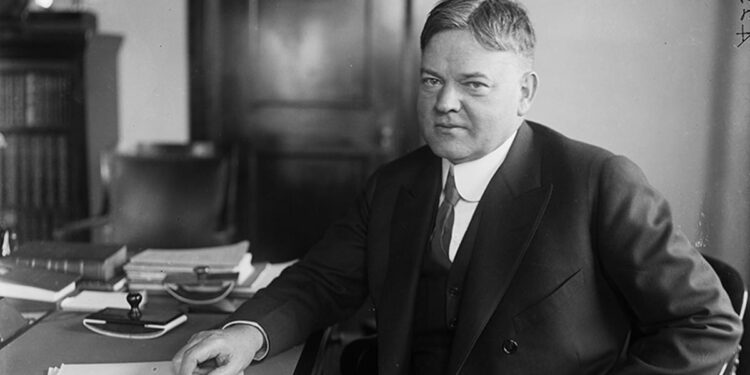Herbert HooverŌĆÖs first foray into politics came during World War I when then president Woodrow Wilson appointed him US food administrator. By the time the war ended, Hoover was famed as a humanitarian. LetŌĆÖs take a closer look at┬Āthe 31st President of the United States
read more
EditorŌĆÖs Note: This is
a series of profiles taking a closer look at US presidents┬Āahead of the 2024 presidential election between Donald Trump and Kamala Harris.
Herbert Hoover came to the Oval Office confident that America was set to triumph over poverty.
Then, the Great Depression struck and all of his best laid plans were turned to waste.
Hoover was overtaken by events out of his control.
Yet, many argue that he failed to gauge just how severe the crisis was ŌĆō particularly given his own history.
LetŌĆÖs take a closer look at┬Ā┬Āthe 31st President of the United States.
Early yearsHoover was born on August 10, 1874 in IowaŌĆÖs West Branch.
His parents were Jesse and Hulda Hoover.
HooverŌĆÖs father was a blacksmith and his mother was a seamstress and a Quaker minister.
The early part of HooverŌĆÖs childhood was everything a boy dreams of ŌĆō working in his fatherŌĆÖs shop and enjoying the bountiful nature of West Branch.
But then his father Jesse had a heart attack and passed away. Hoover was just six.
The next blow would come at age 10 when his mother Hulda died of pneumonia.
Hoover, now an orphan, was sent to his aunt and uncleŌĆÖs home in Oregon.
At 14, Hoover decided to drop out of school and work in his uncleŌĆÖs real estate firm.
Hoover had a change of heart a few years later. By now, he wanted to become a mining engineer and decided to apply to a newly-opened school known as Stanford.
Hoover would graduate from the universityŌĆÖs first ever class and become a millionaire in the years after.
But Hoover would not soon forget the lessons life taught him in his childhood.
PoliticsHooverŌĆÖs first foray into politics came during World War I when then president Woodrow Wilson appointed him US food administrator.
Wilson had good reason for choosing Hoover.
In 1900, Hoover, while working in China had helped evacuate foreigners including 120,000 Americans during the Boxer Rebellion.
Hooever also spent years as chair of the Commission for Relief in Belgium.
By the time the war ended, Hoover was famed as a humanitarian.
He would go on to serve as the head of the American Relief Administration which sent food and supplies to Germany and Russia.
While some criticised Hoover, he insisted on taking the moral high ground.
ŌĆ£Twenty million people are starving. Whatever their politics, they shall be fed,ŌĆØ he was memorably quoted as saying.
By 1920, Hoover, a popular man, was sought after by both parties for a presidential bid.
Hoover instead chose to accept the post of commerce secretary under then president Warren G Harding.
Hebert Hoover and his wife Lou with then president Harding and first lady Florence Harding. Image courtesy: library.doc.gov
He also undertook a number of projects, most notably the Hoover dam.
Hoover in 1928 was chosen as the Republican partyŌĆÖs nominee after then president Calvin Coolidge decided to run.
Hoover, accepting the nomination, said ŌĆ£We in America today are nearer to the final triumph over poverty than ever before in the history of any land. The poorhouse is vanishing from among us.ŌĆØ
Famous last words indeed.
In the general election, Hoover and running mate Charles Curtis faced then New York Governor Alfred E Smith and Joseph T. Robinson.
Hoover prevailed in a landslide ŌĆō netting 444 electoral votes to his Democratic opponentŌĆÖs 87.
Time in officeIn March 1929, Hoover was inaugurated as president.
He immediately set out to address the farm crisis. He convened a special session of Congress and pushed the passage of the Agricultural Marketing Act.
However, in October, the Great Depression struck ŌĆō the worst crisis the US had faced in history.
Hoover didnŌĆÖt freeze in the face of calamity.
Instead, he summoned business, labour and government leaders to the White House for a series of meetings.
He managed to secure promises that jobs would be maintained and wages would not be cut.
President Herbert Hoover delivering the Inaugural address, March 4, 1929. Image courtesy: hoover.archives.gov
He called on Congress to pass a public works programme to provide jobs.
He also proposed the establishment of a Reconstruction Finance Corporation to help business and banks recover.
But it wasnŌĆÖt enough.
In 1931, bank collapses in Europe had sent fresh shockwaves through AmericaŌĆÖs economy.
Many small towns, which were decaying and dying, were known as ŌĆśHoovervilles.ŌĆÖ
The number of unemployed had shot up to 10 million.
Though people called for greater and direct government action, Hoover continued to resist.
Though Hoover campaigned manfully for president ŌĆō going around the country by train ŌĆō he was handily defeated by Franklin D Roosevelt.
Some say Hoover left Washington a thoroughly defeated man.
LegacyHoover is still most closely associated with the Great Depression.
To the end, he believed that state governments, local authorities and charities could bear the burden of the poor and destitute.
He was proven to be mistaken, but he was not the callous and insensitive man his opponents sought to portray him as.
Source link : http://www.bing.com/news/apiclick.aspx?ref=FexRss&aid=&tid=67029685837c43249af71b16936fe5eb&url=https%3A%2F%2Fwww.firstpost.com%2Fworld%2Funited-states%2Fpresidents-of-the-united-states-herbert-hoover-the-president-whose-plans-were-put-paid-by-the-great-depression-13822267.html&c=2193941361142001988&mkt=en-us
Author :
Publish date : 2024-10-06 02:31:00
Copyright for syndicated content belongs to the linked Source.












